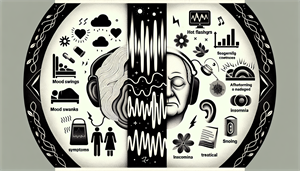
The Connection Between Menopause and Snoring
Are you a woman approaching or experiencing menopause, and suddenly finding yourself snoring more than ever? Rest assured, you’re not alone. Many women face this challenge during menopause, but there are effective ways to manage and reduce snoring. In this article, we will explore the link between menopause and snoring, discuss the factors that contribute to snoring, and provide strategies to help you alleviate this nighttime nuisance.
Understanding the Link Between Menopause and Snoring
Menopause is a natural phase in a woman’s life, marking the end of her reproductive years. While this transition is inevitable, it can also bring about uncomfortable symptoms and changes, including snoring. Snoring in menopausal women is often linked to hormonal changes and a decrease in muscle tone in the throat, which can lead to sleep-disordered breathing. But how exactly do these factors interconnect, and what can be done to alleviate snoring during menopause? Grasping the relationship between menopause and snoring is key to finding suitable solutions.
Hormonal Changes in Menopause
During menopause, women experience various hormonal changes that can directly impact their sleep quality. One significant change is the decrease in progesterone levels, a hormone known for maintaining the structure of the upper respiratory passages and regulating breathing. As progesterone levels decrease, the upper airways can become more relaxed, increasing the likelihood of snoring. Combined hormone replacement therapy (HRT) is one potential solution to address the hormonal imbalances contributing to snoring in menopausal women.
Sleep Disordered Breathing in Menopausal Women
Sleep-disordered breathing, which includes snoring and obstructive sleep apnea, affects many menopausal women due to hormonal shifts and weight gain. These conditions can manifest in a variety of ways, with common symptoms such as loud snoring, gasping or choking during sleep, and excessive daytime sleepiness. Obstructive sleep apnoea syndrome is one of the most prevalent forms of sleep disorders in this population, and snoring occurs frequently as a result.
Weight Gain and Snoring During Menopause
Weight gain during menopause can contribute to snoring in women. Studies have shown a connection between obesity and increased symptoms of sleep-disordered breathing. Managing weight gain, reducing alcohol consumption, and quitting smoking may reduce the likelihood of snoring in menopausal women. Treatments such as hormone replacement therapy (HRT), sleep position adjustments, nasal dilators/sprays, or CPAP therapy are available to improve sleep quality for menopausal women.


